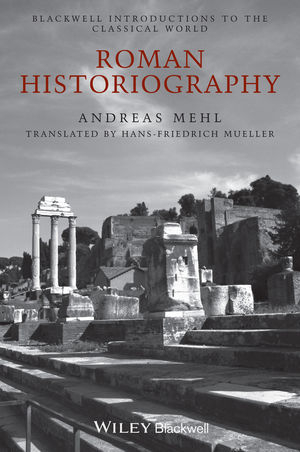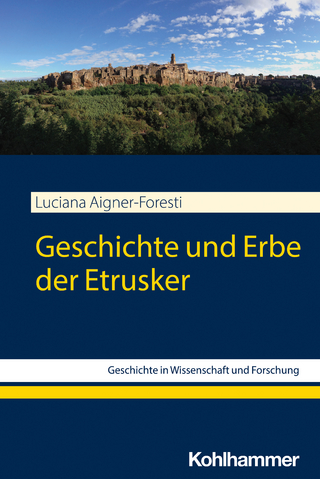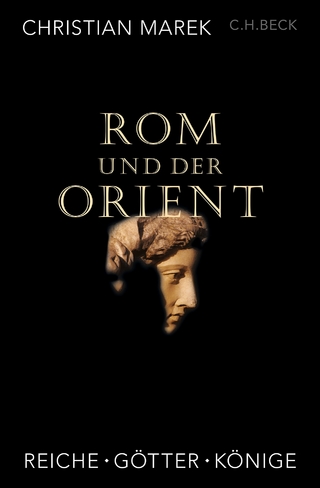
Roman Historiography
Wiley-Blackwell (Verlag)
978-1-118-78513-3 (ISBN)
Roman Historiography: An Introduction to its Basic Aspects and Development presents a comprehensive introduction to the development of Roman historical writings in both Greek and Latin, from the early annalists to Orosius and Procopius of Byzantium.
Provides an accessible survey of every historical writer of significance in the Roman world
Traces the growth of Christian historiography under the influence of its pagan adversaries
Offers valuable insight into current scholarly trends on Roman historiography
Includes a user-friendly bibliography, catalog of authors and editions, and index
Selected by Choice as a 2013 Outstanding Academic Title
Andreas Mehl is Professor of Ancient History at the Martin Luther University at Halle and Wittenberg. He is the author of Seleukos Nikator und sein Reich (1986); Tacitus über Kaiser Claudius: Die Ereignisse Am Hof (1974); and Römische Geschichtsschreibung: Grundlagen und Entwicklungen: eine Einführung (2001). Hans-Friedrich Mueller is the William D. Williams Professor of Classics at Union College in Schenectady, New York. He is the author of Roman Religion in Valerius Maximus (2002) and the editor of an abridgment of Edward Gibbon's Decline and Fall of the Roman Empire (2003).
Translator’s Preface ix
Introduction: The Importance of Ancient Historiography and the Purpose of this Book 1
Chapter 1: Ancient Literature and Roman Historiography 9
1.1 Roman Literature and its Relation to Greek Literature 9
1.2 Roman Historiography and the City of Rome 12
1.3 The Claims of Artistry and Truth in Ancient, especially Roman, Historiography 17
1.3.1 Literary Artistry and Moral Preoccupations in Ancient Historiography 18
1.3.2 “History is what Actually Happened” – Ancient Historiography and the Modern Science of History 26
Chapter 2: The Formation and Establishment of Tradition in the Ruling Class of the Early and Middle Roman Republic 33
2.1 Family Histories and Clan Traditions 34
2.2 The Annales Maximi and the Almanacs of Publius Mucius Scaevola 37
Chapter 3: Early Roman Historiography: Self-Justification and Memory in Earlier Annalistic Writing 41
3.1 Early Annalistic Writing (I) 43
3.1.1 Quintus Fabius Pictor 43
3.1.2 Later Authors (From Cincius Alimentus to Postumius Albinus) 48
3.2 Early Annalistic Writing (II) 49
3.2.1 Marcus Porcius Cato 51
3.2.2 Other Authors (from Cassius Hemina to Sempronius Asellio) 55
3.3 Early Historical Epic in Rome (Naevius and Ennius) 60
Chapter 4: The Historiography of Rome between the Fronts of the Civil Wars 63
4.1 Later Annalistic Writing: Optimates vs. Populares and Traditional Annalistic Writing vs. Contemporary History 66
4.2 Autobiographies, Memoirs, Hypomnemata, Commentarii, and their Influence on the Historiography of Current Events 69
4.2.1 Self-Representations until Cicero 71
4.2.2 Caesar’s Commentarii 72
4.3 The History of Current Events Made to Order and Contemporary Concepts of Historiography (Cicero) 77
4.4 Biography (Cornelius Nepos) 81
4.5 The Experience of the Collapsing and Ruined Republic 84
4.5.1 Gaius Sallustius Crispus 84
4.5.2 Gaius Asinius Pollio 94
4.6 Antiquarian Writings 96
Chapter 5: Augustan Rome, Roman Empire, and other Peoples and Kingdoms 98
5.1 Titus Livius: Roman History from Romulus to Augustus in its Entirety 100
5.2 World History, the History of the World beyond Rome, and Roman History by Non-Romans and New Romans 110
5.2.1 World History and Roman History (from Diodorus to Juba) 111
5.2.2 Dionysius of Halicarnassus: Early Rome and the Greeks 114
5.2.3 Pompeius Trogus: World History round about Rome 116
5.2.4 Universal Chronology (Castor and Dionysius) 119
Chapter 6: Imperial History and the History of Emperors – Imperial History as the History of Emperors 121
6.1 Empire and “Republic”: Senatorial Historiography 127
6.1.1 Gaius (?) Velleius Paterculus 130
6.1.2 Authors of the Julio-Claudian and Flavian Period (from Cremutius Cordus to Pliny the Younger) 133
6.1.3 Publius (?) Cornelius Tacitus 136
6.1.4 Lucius Cl(audius) Cassius Dio Cocceianus 151
6.2 Rome and Foreign Peoples 156
6.2.1 Josephus / Flavius Josephus: Jews and Others 157
6.2.2 Appian of Alexandria: A Retrospective View of the Establishment of Rome’s World Domination 162
6.3 Imperial History as Imperial Biography 165
6.3.1 Gaius Suetonius Tranquillus 166
6.3.2 Marius Maximus and Herodian 170
6.3.3 Historia Augusta / Scriptores Historiae Augustae 171
6.4 Personal History and Biography in the High Empire Beyond Roman Emperors 178
6.4.1 Curtius Rufus and Arrian of Nicomedia: Histories of Alexander 178
6.4.2 Plutarch of Chaeronea: Parallel Lives 183
6.5 History in “Pocket-Size” 186
6.5.1 From the Epitome of Livy, the Epitome of Trogus, and Florus to Lucius Ampelius 187
6.5.2 The Historical Epitomes of the Fourth Century A.D. (Aurelius Victor, Eutropius, Festus) 191
6.6 Exempla-Literature and Historical Understanding 197
Chapter 7: Roman History and Universal History between Classical Religion (“Paganism”) and Christianity 199
7.1 Zosimus and his Predecessors: Classically Religious Historiography and Historical Interpretation in a Christian Age 203
7.2 Ammianus Marcellinus: Indifferent to Religion? 207
7.3 Christian Historiography 216
7.3.1 Church History (Eusebius and Rufinus) 219
7.3.2 From Classically Religious Chronography to Christian Universal Chronicle (Eusebius, Jerome, Sulpicius) 223
7.3.3 Orosius: Universal History through the Lens of Theology 229
7.3.4 Procopius of Caesarea: The History of Current Events in Transition from Rome to Byzantium 237
Chapter 8: Some Basic Principles of Ancient Historical Thought 243
Chronological Table 252
Notes 255
Select Bibliography 264
1. General Bibliography 264
1.1 Editions, Translations, and Commentaries for the Historiographical and Biographical Works Treated in this Book 264
1.2 Editions of Historiographical Works and Historical Epics in Greek and Latin that Survive only in Fragments 270
1.3 Histories of Greek and Latin Literature, especially Historiography: Recent Surveys and Collections 271
1.4 Ancient Historiography, especially Roman: its Basic Literary, Social, and Intellectual Contexts 272
2. The Formation and Establishment of Tradition in the Ruling Class of the Early and Middle Roman Republic 275
3. Early Roman Historiography: Self-Justification and Memory in Early Annalistic Writing 276
4. The Historiography of Rome between the Fronts of the Civil Wars 277
5. Augustan Rome, Roman Empire, and other Peoples and Kingdoms 279
6. Imperial History and the History of Emperors – Imperial History as the History of Emperors 280
7. Roman History and Universal History between Classical Religion (“Paganism”) and Christianity 284
Index 287
| Erscheint lt. Verlag | 17.1.2014 |
|---|---|
| Reihe/Serie | Blackwell Introductions to the Classical World |
| Übersetzer | Hans-Friedrich Mueller |
| Verlagsort | Hoboken |
| Sprache | englisch |
| Maße | 154 x 229 mm |
| Gewicht | 390 g |
| Themenwelt | Geisteswissenschaften ► Geschichte ► Allgemeines / Lexika |
| Geschichte ► Allgemeine Geschichte ► Altertum / Antike | |
| Geisteswissenschaften ► Geschichte ► Regional- / Ländergeschichte | |
| ISBN-10 | 1-118-78513-4 / 1118785134 |
| ISBN-13 | 978-1-118-78513-3 / 9781118785133 |
| Zustand | Neuware |
| Informationen gemäß Produktsicherheitsverordnung (GPSR) | |
| Haben Sie eine Frage zum Produkt? |
aus dem Bereich


